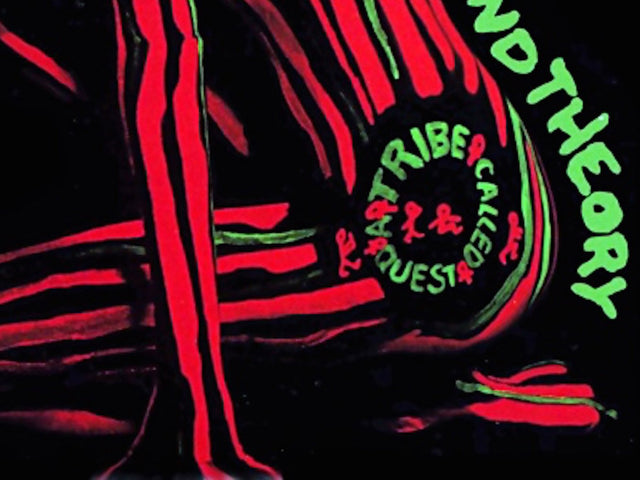Album Minggu Ini: Kami Mendapatkannya Dari Sini...Terima Kasih 4 Layanan Anda
Setiap minggu, kami memberi tahu Anda tentang satu album, di atas yang lainnya, yang perlu Anda nikmati minggu ini. Album minggu ini adalah We Got it From Here...Thank You 4 Your Service, album A Tribe Called Quest yang pertama dalam 18 tahun, dan yang terakhir, sejak anggota pendiri Phife Dawg meninggal awal tahun ini.
Berikut adalah usia anggota A Tribe Called Quest, baik yang penuh waktu maupun paruh waktu, serta beberapa rekan mereka: Q-Tip, 46; Ali Saheed Muhammed, 46; Jarobi White, 45; Busta Rhymes, 44; Consequence, 39. Phife Dawg, yang meninggal lebih awal tahun ini akibat komplikasi penyakit diabetes, dan untuknya We Got It from Here, Thank You 4 Your Service—album Tribe pertama dalam 18 tahun—didedikasikan, berusia 45. Saya menyoroti usia mereka dengan alasan: kita hidup di zaman di mana perbedaan generasi dalam rap tampak lebih lebar dari sebelumnya—atau setidaknya lebih sensasional. Para senior sangat marah dengan kurangnya penghormatan generasi baru terhadap pendahulu mereka; anak-anak mengeluhkan bahwa mereka tidak mendapatkan cukup penghormatan untuk mendorong batasan dan mengembangkan suara mereka sendiri (yang, penting untuk dicatat, sering kali mengambil dari suara yang sudah ada sebagai titik awal).
Apa yang sangat mencolok tentang We Got It from Here, Thank You 4 Your Service adalah bahwa Tribe menerima generasi berikutnya dengan kemurahan hati yang luar biasa, dan bukan karena itu berfungsi sebagai bukti dampak mereka, meskipun itu tentu saja demikian, tetapi karena itu memberikan mereka rasa tujuan. “Bicaralah dengan Joey, Earl, Kendrick, dan Cole, penjaga aliran. Mereka adalah perpanjangan dari jiwa instinktif,” rap Q-Tip di “Dis Generation,” memahami bahwa setiap kelas memiliki tempatnya sendiri dalam sejarah dan terasa terinspirasi oleh gagasan untuk membagikan apa yang telah mereka pelajari selama bertahun-tahun daripada menganggap kaum muda sebagai pesaing yang mendorong mereka keluar dari sorotan dan meninggalkan mereka dalam proses tersebut. “Kids,” yang menampilkan penampilan tamu yang jelas menonjol dari André 3000, bahkan lebih eksplisit dalam hal ini: menarik pada pengalaman yang dibagikan antara generasi daripada menggerutu pada Those Dumb Kids mencegahnya dari merasa pedantik. Baik Three Stacks maupun Q-Tip tidak terdengar sebagai pengawas yang tidak peka tetapi sebagai jiwa-jiwa sejenis yang memiliki kebijaksanaan yang pernah mereka alami dan bisa rap dengan sangat baik.
Dan rap dengan sangat baik adalah sesuatu yang dilakukan oleh semua yang diundang untuk berpartisipasi. Apakah itu irama yang dipengaruhi patois yang mewarnai “Solid Wall of Sound,” yang dengan brilian membalikkan sampel “Benny and the Jets,” atau maju mundurnya yang tanpa usaha ditemukan di “Dis Generation,” di mana Q-Tip, Phife, Busta, dan Jarobi bersukacita dalam meneruskan tongkat di antara satu sama lain, bersyukur bisa berada di lagu yang sama lagi setelah sekian lama. Ini adalah kasus klasik teman yang membawa yang terbaik dari satu sama lain, diperkuat oleh kegembiraan nyata yang ditemukan dalam sekadar berada dalam kehadiran fisik satu sama lain. Jarobi belum pernah seenergi ini, yah, mungkin tidak pernah, dan ia muncul di seluruh album dengan jab yang kuat, paling mencolok di “Movin’ Backwards.” Consequence mencuri perhatian di setiap lagu yang ia tampilkan, dan bersama dengan Busta—yang juga terdengar lebih terlibat di sini daripada dalam satu dekade terakhir—keduanya membentuk pasangan di “Mobius” yang tidak kita tahu kita butuhkan dan sekarang tidak bisa membayangkan tidak pernah mendengarnya. Dan untuk semua komentar tajam album ini, ritme dan alirannya selalu membela dirinya sendiri, kru yang berkumpul bergerak masuk dan keluar dari ritme dengan semangat rapper setengah usia mereka, produksi band live yang tajam dan terasa berat tanpa merasa usang (atau mengundang sakit kepala pembersihan sampel).
Dari banyak tema berulang dalam rekaman ini, perayaannya terhadap persahabatan adalah yang paling kuat. Tidak ada yang lebih menonjol dari “Lose Somebody,” penghormatan yang menyentuh untuk Phife Dawg di mana Q-Tip mengakui kompleksitas hubungan antarpribadi: “Malik, aku akan memperlakukanmu seperti adik kecil, itu membuatmu kesal/ Terkadang terlalu mengatur, meskipun aku pikir itu demi keuntunganmu/ Meski semua pertengkaran dan hal-hal yang didokumentasikan secara sinematik/ Hal yang paling aku hargai: kau dan aku, tidak pernah berpura-pura/ Rima yang akan kita tulis, mengatasi masa sulit/ Memberi wajah anggun secara langsung, memperbaiki keadaan.”
Di “Movin’ Backwards,” Anderson .Paak menyanyikan yang berikut: “Mungkin jawabannya tidak ada di sana, mungkin ada di tanah di suatu tempat.” Dengan kata lain: melihat ke langit untuk bantuan adalah menunggu lama untuk kereta yang tidak datang, dan orang-orang di sekitar kita yang bisa membawa perubahan. Ini bukan wawasan yang baru, tetapi merangkum filosofi Tribe, jika bisa disimpulkan. Dan di waktu yang tidak pasti ketika jurang antara kelompok dengan pandangan berbeda tampak lebih lebar dari sebelumnya, merasa penting untuk didengar. Itu adalah semangat kolaborasi, dan komitmen mereka untuk terus melawan di tengah apa yang terasa seperti odds yang tak tertahankan, dari mana A Tribe Called Quest selalu menemukan kekuatan mereka. Dengan proyek terakhir mereka, sekelompok teman seumur hidup dari Queens, New York telah menyusun penolakan sepanjang album terhadap gagasan bahwa tumbuh lebih tua berarti menjadi lebih kejam atau lebih puas diri atau lebih terasing. Atau, seperti yang dibuktikan oleh We Got It from Here, Thank You 4 Your Service, tidak kurang kuat.
Renato Pagnani is a writer based in Edmonton. He's written for Pitchfork, Rolling Stone, Spin, Fader, Edmonton Journal.



